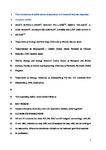The colonization of saline waters is associated with lowered immune responses in aquatic beetles
| dc.contributor.author | Botella-Cruz, M | |
| dc.contributor.author | Pallares, S | |
| dc.contributor.author | Velasco, J | |
| dc.contributor.author | Moody, AJ | |
| dc.contributor.author | Billington, Richard | |
| dc.contributor.author | Millan, A | |
| dc.contributor.author | Bilton, David | |
| dc.date.accessioned | 2022-08-31T10:29:40Z | |
| dc.date.issued | 2022-09-22 | |
| dc.identifier.issn | 1365-2427 | |
| dc.identifier.issn | 1365-2427 | |
| dc.identifier.uri | http://hdl.handle.net/10026.1/19590 | |
| dc.description.abstract |
<jats:title>Abstract</jats:title><jats:p> <jats:list> <jats:list-item><jats:p>The immune response represents a suite of evolved traits that can involve energetic and evolutionary trade‐offs with other energy‐demanding and fitness‐related processes. Here, we tested the hypothesis that aquatic beetles living in inland hypersaline habitats have lower immune capacity than freshwater congeners.</jats:p></jats:list-item> <jats:list-item><jats:p>Phenoloxidase activity, encapsulation response and antimicrobial peptide activity were compared in freshwater/hypersaline species pairs with differing osmoregulatory capacity and cuticular waterproofing properties in the genera <jats:italic>Nebrioporus</jats:italic> (Dytiscidae) and <jats:italic>Enochrus</jats:italic> (Hydrophilidae), independent evolutionary lineages that have colonised saline media separately.</jats:p></jats:list-item> <jats:list-item><jats:p>Hypersaline species (<jats:italic>N. ceresyi</jats:italic> and <jats:italic>E. jesusarribasi</jats:italic>) showed significantly lower phenoloxidase activity and antimicrobial peptide responses than their freshwater relatives (<jats:italic>N. clarkii</jats:italic> and <jats:italic>E. salomonis</jats:italic>). Encapsulation responses in freshwater species also appeared to be higher than in hypersaline relatives.</jats:p></jats:list-item> <jats:list-item><jats:p>Our results reinforce the complex nature of immune responses and suggest that adaptation to saline environments may have involved a trade‐off between osmoregulation and investment in immune defences, but also are consistent with relaxed selection pressures on basal immune responses resulting from lower microbial infection load in saline habitats. In addition, the more resistant cuticle of species occupying such habitats may protect against the entry of parasites, reducing selection pressure on immunity.</jats:p></jats:list-item> <jats:list-item><jats:p>Because the evolution of salinity tolerance is associated with reduced immune capacity, saline specialists may be particularly vulnerable to the dilution of saline waters and consequent changes in pathogen communities and load following colonisation by more generalist microorganisms.</jats:p></jats:list-item> </jats:list> </jats:p> | |
| dc.format.extent | 2024-2034 | |
| dc.language | en | |
| dc.language.iso | en | |
| dc.publisher | Wiley | |
| dc.subject | antimicrobial peptides | |
| dc.subject | aquatic coleoptera | |
| dc.subject | encapsulation | |
| dc.subject | hypersaline waters | |
| dc.subject | immunity | |
| dc.subject | phenoloxidase | |
| dc.subject | trade-off | |
| dc.title | The colonization of saline waters is associated with lowered immune responses in aquatic beetles | |
| dc.type | journal-article | |
| dc.type | Journal Article | |
| plymouth.author-url | https://www.webofscience.com/api/gateway?GWVersion=2&SrcApp=PARTNER_APP&SrcAuth=LinksAMR&KeyUT=WOS:000857693800001&DestLinkType=FullRecord&DestApp=ALL_WOS&UsrCustomerID=11bb513d99f797142bcfeffcc58ea008 | |
| plymouth.issue | 12 | |
| plymouth.volume | 67 | |
| plymouth.publication-status | Published | |
| plymouth.journal | Freshwater Biology | |
| dc.identifier.doi | 10.1111/fwb.13993 | |
| plymouth.organisational-group | /Plymouth | |
| plymouth.organisational-group | /Plymouth/Faculty of Science and Engineering | |
| plymouth.organisational-group | /Plymouth/Faculty of Science and Engineering/School of Biological and Marine Sciences | |
| plymouth.organisational-group | /Plymouth/REF 2021 Researchers by UoA | |
| plymouth.organisational-group | /Plymouth/REF 2021 Researchers by UoA/UoA07 Earth Systems and Environmental Sciences | |
| plymouth.organisational-group | /Plymouth/Research Groups | |
| plymouth.organisational-group | /Plymouth/Research Groups/Marine Institute | |
| plymouth.organisational-group | /Plymouth/Users by role | |
| plymouth.organisational-group | /Plymouth/Users by role/Academics | |
| dcterms.dateAccepted | 2022-08-23 | |
| dc.rights.embargodate | 2023-8-23 | |
| dc.identifier.eissn | 1365-2427 | |
| dc.rights.embargoperiod | Not known | |
| rioxxterms.versionofrecord | 10.1111/fwb.13993 | |
| rioxxterms.licenseref.uri | http://www.rioxx.net/licenses/all-rights-reserved | |
| rioxxterms.type | Journal Article/Review |


